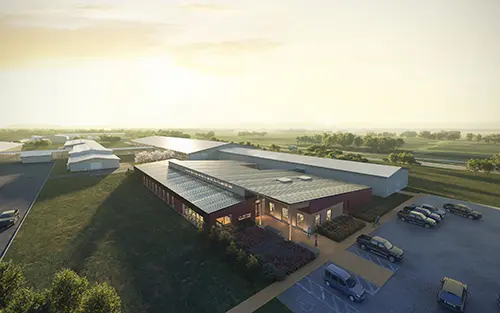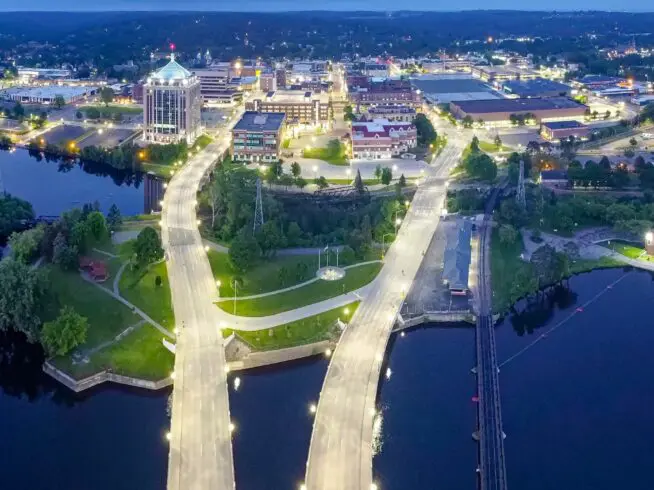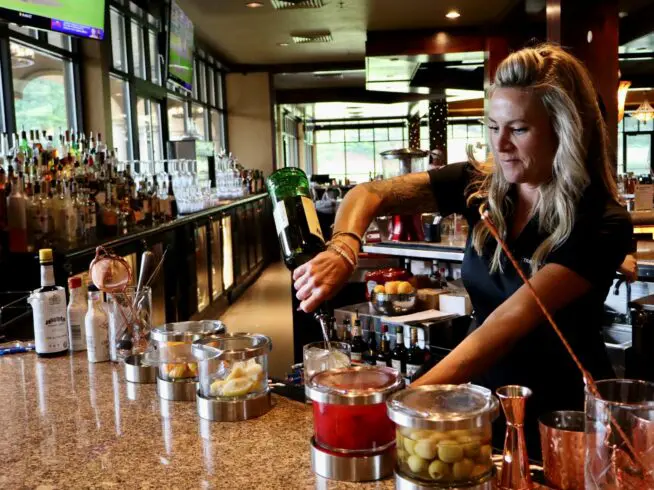Fight in Legislature over ‘forever chemical’ funds stalls help for Wisconsin communities
Residents of French Island in La Crosse County have had to rely on bottled water for three years.

Once a month, Susan Adams and her family place a dozen or so empty blue plastic five-gallon water jugs outside their house on French Island in La Crosse County. A Culligan Water worker comes and refills the jugs, and Adams’ family drags them back into the house.
The jugs are stored on a rack in the front room next to a piano until they’re ready to be hooked up to the water cooler in their kitchen or to replace the one in their upstairs bathroom. Adams’ family of five uses this bottled water for cooking, drinking, brushing their teeth and giving water to their two cats. They live under the assumption that their tap water is contaminated with a group of synthetic “forever chemicals” called per-and polyfluoroalkyl substances, or PFAS, that have polluted many wells in the community.
The chemicals are believed to have originated in firefighting foam used upstream at the La Crosse Regional Airport. PFAS are linked to a number of health risks that include cancer, fertility issues, and liver damage.
Adams’ family has been using bottled water for nearly three years, and they have had to reckon with the new reality that simple tasks such as refilling the ice cube trays could now be hazardous. Her 79-year-old mother-in-law, who also lives on the island, struggles to move and lift the heavy jugs herself. Adams turns down vegetable plants that friends offer her because she’s afraid of watering them with their tap water. Her family still showers and does laundry with it.
“You would drive yourself absolutely insane if you tried to use bottled water for everything,” she said.

French Island, which is under the town of Campbell’s jurisdiction and sits next to the city of La Crosse between the Mississippi and Black rivers, isn’t alone. Other communities in Wisconsin, including Peshtigo and Madison, have been discovering PFAS in their water in recent years, too.
To address what has now become a statewide issue, the budget Gov. Tony Evers signed in 2023 earmarked $125 million to address PFAS. But Republicans who control the Legislature’s Joint Finance Committee have refused to release the funding after Evers vetoed their plan for allocating it, over concerns about how the money would be spent, and Evers is now suing them over it.
This impasse has left French Island residents feeling frustrated, said Lee Donahue, a Campbell Town Board supervisor.
“We’ve got to figure out a way that we can come together in a bipartisan way and say, People are hurting. It’s a health crisis,” Donahue said.
The town has an engineering plan ready to go that would connect the island to a new, uncontaminated water source. If the funding was distributed by the state, they could start on the project immediately. But Donahue’s now hearing from state leaders that the money may get pushed to the next budget cycle in 2025.
“We can’t afford to wait until next January. I’ve got work going on, we have engineering plans. We can’t just sit around and go, Let’s see, maybe eight months from now we’ll get some money and we’ll be able to do something. That’s just craziness,” she said.
Meanwhile, other funding has helped the town make progress. A new well was built last year that dips into a deeper aquifer that the town hopes to use to feed its new water system. That was paid for by La Crosse County and was built to make sure the new water source was uncontaminated. The town also plans in the next few months to break ground on a second well, which is being funded by the federal Bipartisan Infrastructure Law. Yet another well is being built at the town hall that will be used for research, monitoring the old and new water systems.
The wells are just the beginning, though. The town also needs to build a water tower and dig up its roughly 26 miles of road to lay new water pipes and connect each house to the new system.
Adams said she dreams of a bottle-free future. But as the calendar pages keep turning, she worries about the lasting impact the pollution may have, from dips in home sales on the island to the condition of the community they’re leaving behind for their children.
“I honestly have no idea what the solution is. It’s going to take time, and it’s going to take people working together, that we seem to be unwilling to do right now,” she said.
“When is it going to start to be about the people and not about the money?” Adams said. “Actually, let’s even throw in, when is it going to be about the people and the environment, and not about the money? Because if we contaminate our world, we have no place to live.”

Donahue has nightmares, worried she’s not doing enough or isn’t searching hard enough for solutions. PFAS have consumed most of her days for the past four years. She said she doesn’t know how the legislators holding up the money sleep at night.
Even years later, Donahue still finds herself mistakenly reaching for the tap. She uses bottled water for everything at her house. She collects rainwater to water her garden, which she plants in pots with soil she gets off the island. When she sits down at a restaurant, the first thing she tells the waiter is not to bring her any water.
“I would say to every legislator who’s involved, if it was your child, your grandchild, your elderly parent, how hard would you work to make sure that when they turned on their water, they drink something that wouldn’t kill them? If it was your backyard, how hard would you work to access this money?” she said.




